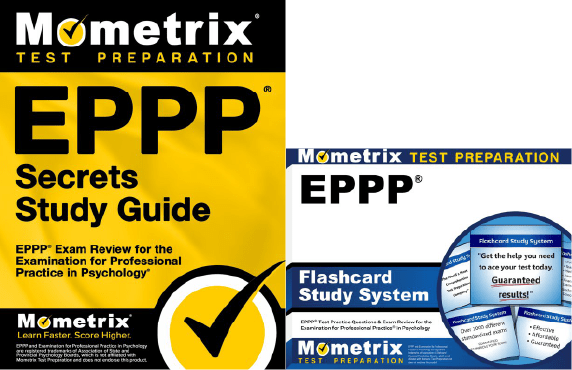If you need help studying for the Examination for Professional Practice in Psychology® or just want some more information about what the test is like, you’ve come to the right place.
Click below to take a free EPPP® practice test!
What’s on the Exam?
How to Register
Exam Scores
Retaking the Exam
Online EPPP Prep Course
FAQs
Exam Eligibility
Before you can register to take the EPPP exam, you’ll have to apply for licensure to your state licensing authority. They’ll review your credentials and determine if you’re eligible to take the exam.
What’s on the Exam?
Part 1: Knowledge
First, let’s talk about the questions on the Knowledge section of the exam. There are 225 multiple-choice questions total, but only 175 of the questions will count toward your score. Why is that?
The 50 unscored questions on the Knowledge exam are called “pretest” questions. These are added to the exam to determine if they’re good enough questions to add to future versions of the test.
The trick is that you won’t have any way of knowing which questions are scored and which ones are pretest. They will appear just like the scored questions throughout the test.
The time limit for the exam is 4 hours and 15 minutes. There aren’t any scheduled breaks, but you’re free to take restroom breaks as needed.
Let’s take a closer look at the different content areas in this section of the exam:
1. Biological Bases of Behavior
10% of the exam
- Neurobiological and genetic factors underlying perception, cognition, personality, mood, and affect in normal conditions and acute and chronic neurobehavioral diseases, including comorbidities.
- Classification, mechanisms, and desired/adverse effects of therapeutic agents, drugs of abuse, and alternative treatments
- Key findings from major trials and guidelines for pharmacological, psychotherapeutic, and combined treatments of psychological disorders
- Behavioral genetics, gene transmission and modification, and the role and limits of genetic information in understanding disorders
- Use and effectiveness of brain imaging, electrophysiology, drug monitoring, and genetic screening methods
2. Cognitive-Affective Bases of Behavior
13% of the exam
- Theories and models of intelligence
- Theories, models, and principles of learning
- Theories and models of memory
- Theories and models of motivation
- Theories and models of emotion
- Elements of cognition
- Relations among affect, cognitions, behavior, mood, and temperament
- Impact of psychosocial factors on behaviors and cognitions
3. Social and Cultural Bases of Behavior
11% of the exam
- Theories and models of social cognition
- Social interaction and relationships
- Group and systems processes
- Personality theories and models
- Diversity and intersectionality
- Causes, manifestations, and effects of oppression
4. Growth and Lifespan Development
12% of the exam
- Normal growth and development across the lifespan
- Impact of individual‐environment interaction on development over time
- Theories and models of development
- Impact of diverse identities on development
- Family development, configuration, and functioning
- Life events that may impact the course of development across the lifespan
- Protective and risk factors that may impact a developmental course
- Diseases and disorders that impact the expected course of development
5. Assessment and Diagnosis
16% of the exam
- Psychometric theories
- Test construction and standardization procedures
- Assessment theories and models
- Assessment methods
- Commonly used instruments for measuring the characteristics and behaviors of individuals
- Issues of differential diagnosis
- The assessment of groups and organizations
- Selection and adaptation of assessment methods
- Classification systems and their underlying rationales and limitations
- Factors influencing interpretation of data and decision‐making
- Constructs of epidemiology
- Theories and models of psychopathology
- Measurement of outcomes and changes
- Using technology to implement tests, surveys, and other forms of diagnostic evaluation
6. Treatment, Intervention, and Prevention and Supervision
15% of the exam
- Factors related to treatment or intervention decision-making
- Contemporary theories and models of treatment, intervention, and prevention
- Treatment techniques and interventions
- Methods of prevention, intervention, and rehabilitation
- Interventions to enhance growth and performance
- Consultation models and processes
- Models of vocational and career development
- Technology‐assisted psychological services
- Healthcare systems, structures, and economics
- Health promotion, risk reduction, resilience, and wellness
- Contemporary theories and models of supervision
7. Research Methods and Statistics
7% of the exam
- Sampling and data collection methods
- Case, correlational, quasi‐experimental, and experimental studies
- Analytic methods
- Statistical interpretation
- Critical appraisal and application of research findings
- Evaluation strategies and techniques
- Considerations regarding community involvement and participation
- Disseminating and presenting research findings
8. Ethical/Legal/Professional Issues
16% of the exam
- Current ethical principles and codes for psychologists
- Professional standards and relevant guidelines
- Laws, statutes, and judicial decisions that affect psychological practice
- Potential ethical issues
- Models of ethical decision‐making
- Continuing professional development
- Emerging social, legal/ethical, and policy issues
- Client and patient rights
- Ethical issues in conducting research
- Ethical issues in supervision
- Ethical issues in technology-assisted psychological services
Part 2: Skills
First, let’s talk about the questions on the Knowledge section of the exam. There are 170 multiple-choice questions total, but only 130 of the questions will count toward your score. Why is that?
The 40 unscored questions on the Skills exam are called “pretest” questions. These are added to the exam to determine if they’re good enough questions to add to future versions of the test.
The trick is that you won’t have any way of knowing which questions are scored and which ones are pretest. They will appear just like the scored questions throughout the test.
The time limit for the exam is 4 hours and 10 minutes. There aren’t any scheduled breaks, but you’re free to take restroom breaks as needed.
Let’s take a closer look at the different content areas in this section of the exam:
1. Scientific Orientation to Practice
6% of the exam
- Selecting and critically reviewing relevant research literature
- Acquiring and disseminating knowledge in accord with scientific and ethical principles
2. Assessment and Intervention
33% of the exam
- Individual and diversity characteristics in assessment and diagnosis
- Effective interviewing skills
- Administering and scoring instruments
- Interpreting and synthesizing results from multiple sources
- Formulating and communicating diagnoses, recommendations, and/or professional opinions
- Selecting interventions for clients
- Applying and modifying interventions
3. Relational Competence
16% of the exam
- Integrating theory, research, professional guidelines, and personal understanding about social contexts
- Working effectively with individuals, families, groups, communities, and/or organizations
- Demonstrating respect for others
- Identifying and managing interpersonal conflict
4. Professionalism
11% of the exam
- Boundaries of competence
- Critically evaluating one’s own professional practice
5. Ethical Practice
17% of the exam
- Values and behaviors commensurate with standards of practice
- Representing and documenting work performed in professional practice and scholarship
- Ethical practice management
- Maintaining a process that promotes ethical decision-making
6. Collaboration, Consultation, and Supervision
17% of the exam
- Working effectively within organizations and systems
- Interdisciplinary collaborations
- Consulting and collaborating within and across professions
- Evaluating service or program effectiveness
- Ensuring supervisee compliance with policies and procedures
- Monitoring, evaluating, and communicating supervisee performance
- Creating and maintaining a supportive environment
How to Register
Once you’ve been approved to take the EPPP exam, you can begin the registration process!
The licensing authority that approves you will set up an ASPPB account for you and authorize your information with Certemy. You’ll get two emails from Certemy which will tell you how to complete the registration process.
Exam Scores
The EPPP exam is scored using a scaled scoring method. Here’s how it works:
For every question you answer correctly, you get one point added to your raw score. At the end of the test, your final raw score will be converted to a scaled score. This scaled score will range somewhere between 200 and 800.
The reason your raw score is converted to a scaled score is because everyone that takes the test is given a slightly different set of questions. Since everyone has a different arrangement of questions, and because some questions are harder than others, converting your raw score to a scaled score ensures a more even playing field.
Receiving Your Score
You’ll get an unofficial score report as soon as you finish the exam, and your official score will be reported to our licensing authority within 10 days.
Retaking the Exam
If you didn’t get a passing score on your first try, that’s okay! You can take the exam up to four times per year.
Just know that you’ll have to go through the entire approval and registration process for each attempt, including paying the testing fee(s).
Online EPPP Prep Course
If you want to be fully prepared, Mometrix offers an online EPPP prep course. The course is designed to provide you with any and every resource you might want while studying. The EPPP course includes:
The EPPP prep course is designed to help any learner get everything they need to prepare for their EPPP exam. Click below to check it out!
FAQs
How many questions are on the EPPP?
The exam contains 395 multiple-choice questions total.
What is the time limit for the EPPP?
The full exam is timed at 8 hours and 25 minutes.
What is the passing score for the EPPP?
You should aim to get a final scaled score of at least 500 on both sections of the exam.
How much does the EPPP exam cost?
The testing fee is $1,050 for the full exam.
What does EPPP stand for?
EPPP stands for Examination for Professional Practice in Psychology.
EPPP and Examination for Professional Practice in Psychology are registered trademarks of Association of State and Provincial Psychology Boards, which is not affiliated with Mometrix Test Preparation and does not endorse this page.



 EPPP Online Course
EPPP Online Course EPPP Study Guide
EPPP Study Guide EPPP Flashcards
EPPP Flashcards

